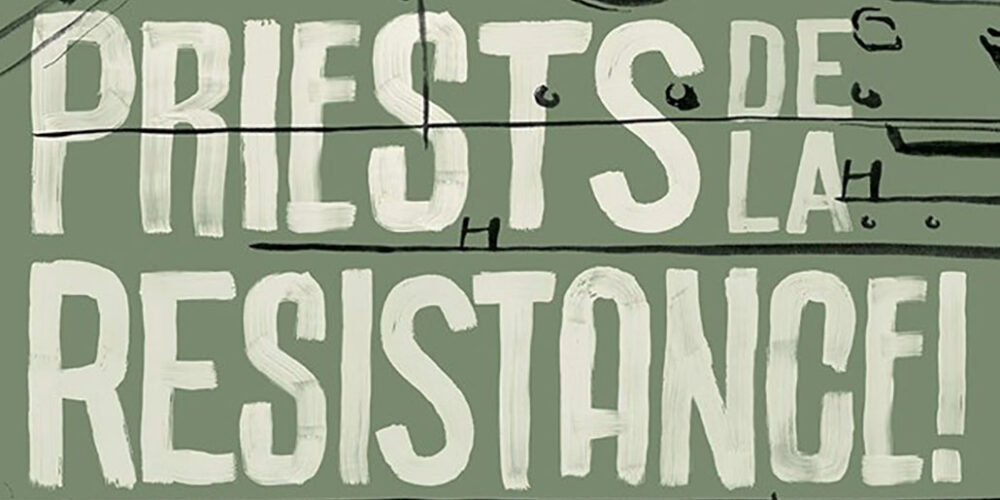Revd Fergus Butler-Gallie, Priests de la Resistance! (London: Oneworld Publications, 2019)
With a jokey title like that, an equally jokey subtitle (The Loose Canons Who Fought Fascism in the Twentieth Century), and a super-scrupulous attention to his own title (“the Revd Fergus Butler-Gallie”), I should have sensed something fishy, but the cover illustration of a resolute-looking French priest in beret and soutane sitting next to a machine gun led me astray.
Butler-Gallie, as the double-barrelled name implies, is a child of the British middle classes, Oxbridge-educated and following in the family business as a vicar in the Church of England. Also typical is his obsession with the Second World War, or rather his narrow obsession with the Second World War as seen through the rose-coloured glasses (made in England) that exaggerate the role of Britain and the United States and ignores completely the role of the Soviet Union.
Nonetheless, Butler-Gallie highlights a handful of clerical anti-fascists who fought the good fight while their institutional leaders sat on the fence or even actively supported the fascist cause as a bulwark against “atheistic communism.” The wartime exploits of Abbé Pierre would be well known in France, where this mountaineering monk with a weak chest became a leader of the Resistance in south-eastern France. Forced by the Gestapo to go on the run, he escaped to the Free French in Algiers, pausing only long enough to exchange his cassock for khaki and rushing off to participate in the liberation of Paris.
The pastor and theologian Dietrich Bonhoeffer also features in Priests de la Resistance. His anguished path from moral and religious opposition to the Nazi regime—to actual participation in the failed attempt to assassinate Hitler on 20 July 1944, to death by hanging on 9 April 1945, weeks before the unconditional surrender of Nazi forces in Berlin to General V. I. Chuikov and the victorious Red Army—is also well known, both in Germany and elsewhere.
Other figures mentioned by “the Revd” are priests and pastors who worked to save Jewish lives in the face of institutional Christian indifference to some of the workings of Nazi ideology. Not surprisingly, however, there appears to be no record of either institutional or individual clerical support for LGBT+ victims of fascism.
While humanitarian aid and the saving of lives is to be applauded, a book that claims to be about those who “fought fascism” that can only come up with two French priests who actually worked and fought against fascism might find itself facing charges of false advertising!
Admittedly, the story of the conservative Catholic Canon Kir of Dijon, a larger-than-life character who spied and sabotaged his way through the war only to befriend the first secretary of the Communist Party of the Soviet Union, Nikita Sergeyevich Khrushchev, in post-war years is well worth a read. Rumour has it that their friendship was in part based on a joint interest in town twinning—and a mutual admiration for one another’s capacity for drink! In any case, the French Communist Party refused to put up candidates against Canon Kir in post-war mayoral elections, so it was win-win for him.
What is missing from this lightweight book of close to 300 pages is any account of committed front-line anti-fascists of a clerical persuasion. And they are not that hard to find. All Butler-Gallie had to do was to look to Ireland. Robert Hilliard was a Church of Ireland priest from Co. Kerry. While at Trinity he became an active republican, fed IRA men “on the run” while home on holiday, and is said to have voted “early and often” for the anti-Treaty side. He was also a champion bantamweight boxer and represented Ireland in the 1924 Olympic Games in Paris.
The Civil War may have prevented him completing his degree at Trinity. In any case, the newly married Hilliard moved to London in 1926 and took up a career in journalism. It was during this time that he came to his slightly idiosyncratic belief that “pure Marxism was Christianity in practice, only without Christ.” Perhaps to put the Christ back in, he decided to move back to Dublin, complete his degree, and seek ordination in the Church of Ireland.
As a curate in working-class Belfast he came into close contact with the campaign against the means test, which was leading to five hundred workers a week being turned down for outdoor relief (unemployment assistance). Communists were heavily involved in this non-sectarian and cross-community campaign.
Health problems and financial difficulties, as well as a growing estrangement from his local church authorities, finally led to Hilliard moving to London in 1932, where he joined the Communist Party. By December 1936 he had left for Spain to join the International Brigades. As Christy Moore sang in “Viva la Quinca Brigada,”
Bob Hilliard was a Church of Ireland pastor;
From Killarney cross the Pyrenees he came.
Robert Hilliard died on 11 February 1937, along with seven thousand other anti-fascists fighting for the Spanish Republic against Franco and his Nazi allies. In his last letter home, five days before he died, he wrote: “I still hate fighting but this time it has to be done, unless fascism is beaten in Spain & in the world it means war and hell for our kids.”
The anti-fascist priest Robert Hilliard didn’t find a place in Fergus Butler-Gallie’s book. Neither did more contemporary priests and people of faith fighting not only fascism but imperialism and the capitalist system itself. In fact Butler-Gallie’s Eurocentric vision seems to have precluded the inclusion of modern anti-imperialist and anti-capitalist fighters, such as the revolutionary Colombian priest Camilo Torres, who was killed in 1966 while fighting with the Ejército de Liberación Nacional (National Liberation Army). Similar creative cross-fertilisation between Marxist-Leninist revolutionaries and religiously motivated anti-fascists and anti-imperialists in the contemporary United States, the Philippines and India also find no place in Butler-Gallie’s blinkered look at anti-fascist religious.
In the end, Butler-Gallie offers not much more than a few passable anecdotes and a complete lack of understanding of imperialism and class society. For the Fergus Butler-Gallies of this world, fascism is just “human nature,” a “trope” that will continue to reappear because we are flawed and “fallen” by nature. For the rest of us, the working class shaking off our chains, fascism is, among other things, a characteristic symptom of the decay and dissolution of the capitalist system (Clara Zetkin), which it is our revolutionary duty to fight against and defeat and to replace with a system organised not for the private profit of the few but for the common needs of the many.






